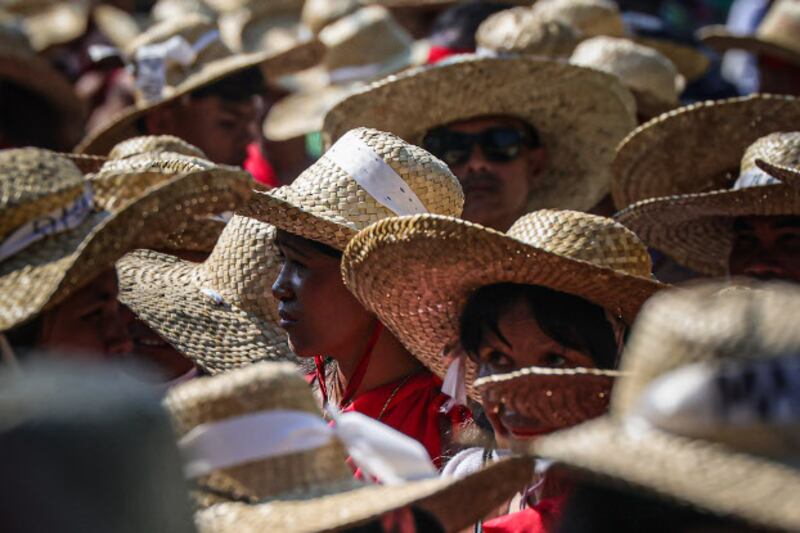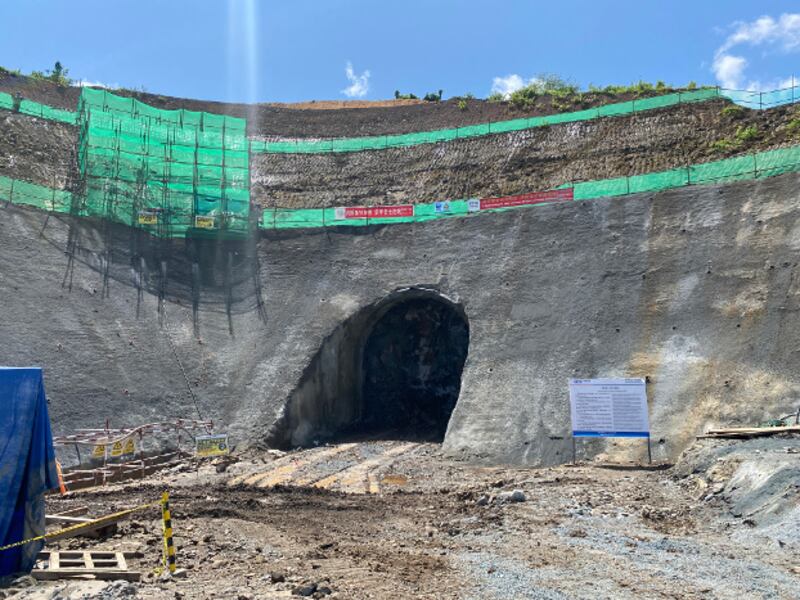About 300 indigenous people from communities to be displaced by a China-funded dam trooped to the presidential palace in Manila on Thursday, ending their nine-day 150-km (92-mile) march to protest the project.
Members of the Dumagat-Remontados communities and their supporters called on President Ferdinand Marcos Jr. to stop the ongoing construction of the 60-meter (196-foot) high Kaliwa Dam, a flagship project of Marcos’ predecessor, Rodrigo Duterte.
The project is envisioned to provide a long-term solution to the water shortage in Metro Manila, although environmental groups have said it would destroy the Sierra Madre mountain range, considered the Southeast Asian nation's shield against devastating typhoons.
The project would displace indigenous communities from their ancestral land in the provinces of Quezon and Rizal in southern Luzon, the biggest island in the country.
Conchita Calzado, an environmental activist who serves as the coalition’s spokeswoman, called on Marcos to listen to their plea.
“Despite the heat, the rains, we traversed Quezon province to go here in Manila just to plead to the president to listen to us. He should not listen to his government agencies because they were spewing lies,” Calzado said in a speech.
“We are relying on your support because this is not just for us, we are fighting for the environment and for everyone’s welfare.”

Marcos did not respond to the protesters.
The dam, financed by a U.S. $211 million (11.6 billion pesos) Chinese loan, is being constructed by the Metropolitan Waterworks and Sewerage System (MWSS). It was one of the big-ticket projects negotiated under Duterte, whose administration was criticized for welcoming money from China in exchange for his silence on territorial disputes in the South China Sea.
On their way to Malacañang Palace on Thursday, the marchers stopped at government offices involved in the project, including the MWSS and the Department of Environment and Natural Resources.
Joined by a network farmers, fishermen and activists, they were greeted by a barricade of police officers and firetrucks as they neared the palace at dusk.
The protesters accused the National Commission on Indigenous Peoples (NCIP) of acting as “spokespersons” of the MWSS instead of carrying out its mandate of protecting their rights. They said the process of obtaining consent was railroaded and accused the MWSS and NCIP of harassing and manipulating community members.
NCIP refuted the claims, saying there was “a long and delicate” discussion among affected communities over the years, with officials personally visiting and answering questions of the communities’ leaders. These consultations, it said, were done according to the virtues and customary law of the tribe, but were complicated by the existence of different tribal leaders and factions in the community.
“Those marching are being fed with lies and it is saddening that the natives are again being used by various interest groups to further their dubious objectives and fraudulent activities,” the NCIP said in a Facebook post.
Flooding, environmental damage
The government has claimed that the communities would not be under water once the dam is operational.
"They will not be submerged except for some seasonal crops that are on the riverbanks which are included in the inventories and will be paid for. Their community is far from the inundation area of the Kaliwa Dam and they are in the higher part," NCIP said.
The Department of Public Works and Highways said it has allotted 380 million pesos ($6.9 million) for flood control projects in the towns of Infanta and General Nakar in Quezon province. It added that the nearby Agos River is being dredged.
Environmentalists, meanwhile, said the dam would cause irreversible damage to the environment, as the project would affect protected areas, including the Kaliwa watershed, a declared forest reserve and national wildlife sanctuary.
The national resources department gave an environmental clearance in 2019 despite resistance from environmentalists.

In December 2022, the Supreme Court dismissed a petition that sought to nullify the Philippine government’s loan agreements with China on the Kaliwa Dam project and the Chico River Irrigation Project in north Luzon. The court ruled the loan deals “sufficiently complied” with the Philippine Constitution.
Kaliwa Dam is expected to be completed by mid-2026, supplying 600 million liters of water a day to Metro Manila and nearby areas.
Contractor China Energy Engineering Corp. (CEEC) began excavating a tunnel to carry water from the dam to Manila in December.
In 2019, the World Bank debarred a related firm, CEEC-Hunan Electric Power Design Institute, for 20 months for apparently falsifying documents describing its past contract experience, litigation history and business credentials related to a project in Zambia.
Gerard Carreon in Manila contributed to this report.
